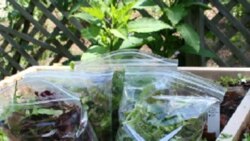This is the VOA Special English Agriculture Report.
Call it "recession gardening" or a product of the local foods movement. But, whatever the reason, more Americans are growing some of their own food. Or at least they are trying to.
Many need advice from experts like the master gardeners at the University of Maryland Extension service. The extension service has launched "Grow It Eat It." This campaign is a response to what they call "the huge new demand" for information and help with home gardens. Master gardeners from throughout the state are helping less experienced people learn how to work the land.
Food gardeners can join a network and put their garden on a map on the extension service Web site. The goal: one million food gardeners in Maryland "producing their own affordable, healthy food." The current count of food gardeners is around five thousand statewide.
Nationally, sales of garden supplies increased last year as people started or expanded food gardens. Sales rose thirty percent at Burpee, a major seller of seeds.
Shannon Dill is the extension agent for Talbot County, Maryland. She says the weak economy is not the only reason people are trying to grow their own food to save money.
Prices for fruits and vegetables at the store are up. Shannon Dill finds that growing food at home usually costs less than buying it at stores or restaurants. She also finds that people seem to be staying home more, so they have more time to work in the garden. And, she says, "People like to know where their food is coming from."
But sometimes people choose the wrong plants for the local growing conditions. Or they plant at the wrong time. Or they plant seeds too close together or in poor soil or without enough daily sunlight. Master gardeners can help people avoid mistakes.
Nancy Garrison started the first master gardener program in Santa Clara County, California, almost thirty years ago. She says organic material such as leaf mulch, also called leaf mold, can almost always improve poor soil. Once the soil is improved, she says, then "worms can do a lot of your work for you."
A vegetable garden in front of a house may not seem unusual in rural areas. But a lawyer who lives in suburban Maryland, outside Washington, grew squash, cucumbers and tomatoes on his front lawn last year. How did his neighbors react? He says many of them congratulated him on his garden.
And that's the VOA Special English Agriculture Report, written by Jerilyn Watson. I’m Bob Doughty.




